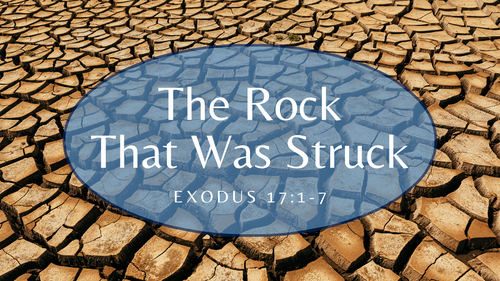Massah & Meribah | Exodus 17:1-7

“And he called the name of the place Massah and Meribah, because of the quarreling of the people of Israel, and because they tested the LORD by saying, ‘Is the LORD among us or not?’”
Exodus 17:7
In Scripture, names matter. Names remember. They mark moments, establish meaning, and declare to future generations what happened in a particular place.
Here in Exodus 17:7, after God brings water from the rock and quenches the thirst of His rebellious people, Moses gives the place a name: Massah and Meribah—literally, “testing” and “quarreling.”
Why name it that?
Because the people failed the test.
They didn’t trust. They didn’t pray. They didn’t wait. They quarreled and accused and doubted—even after all that God had done.
And in their unbelief, they asked one of the most tragic questions in the Bible:
“Is the LORD among us or not?”
This is a question born of unbelief. A question that dishonors the faithfulness of God. A question that reveals how easily our hearts forget.
This article will examine the danger of asking that question and what it reveals about our own wilderness moments today.
The People Named the Place by Their Sin
When you walk through hard seasons, you can either name them after God’s faithfulness—or after your own failure.
Moses names the place Massah and Meribah not to shame the people, but to teach them. This was a warning. A memorial.
It was a way of saying: “Remember what happened here. Remember how your unbelief nearly destroyed you.”
In Deuteronomy 6:16, Moses will later tell the next generation:
“You shall not put the LORD your God to the test, as you tested Him at Massah.”
In Psalm 95, the psalmist pleads:
“Do not harden your hearts, as at Meribah, as on the day at Massah in the wilderness...” (Psalm 95:8)
The memory of this moment became part of Israel’s spiritual vocabulary. It was a solemn reminder: God is faithful—even when we are not. But we must never presume upon His patience.
Matthew Henry writes:
“Places must be remembered not only for mercies received but for sins committed—that we may fear, and not forget.”
The Great Sin: “Is the LORD Among Us or Not?”
This question in verse 7 is not innocent curiosity—it is accusation.
It’s not “Where is God?” like David’s psalms of lament. It is “Is He even real? Does He care? Has He abandoned us?”
This is unbelief in full bloom.
After all they had seen—Egypt’s plagues, the Red Sea, the manna from heaven—they still ask this?
William Perkins remarks:
“Such a question, in light of such evidence, is not weakness—it is rebellion. It is a willful blindness to the goodness of God.”
The people demand God to prove Himself again—as if His past mercies had an expiration date.
This is what we do when we tie our trust to our circumstances.
When life is smooth, we say, “God is good.”
When life gets hard, we say, “Where is He?”
But God’s presence is not measured by comfort. He is no less with us in the valley than on the mountain.
Hebrews 13:5 promises:
“I will never leave you nor forsake you.”
Unbelief Always Forgets What God Has Done
Why would the people doubt God’s presence?
Because they had forgotten.
They forgot the blood on the doorposts. They forgot the walls of water at the Red Sea. They forgot the bread from heaven.
Their pain in the present blurred their memory of the past.
This is one of the most dangerous patterns in the Christian life. We let present trials erase past deliverance.
Psalm 106:7 says of this very event:
“They did not remember the abundance of Your steadfast love, but rebelled by the sea, at the Red Sea.”
Martyn Lloyd-Jones observed:
“The sin of the Church is not that she faces trial—it is that she forgets what God has already done.”
Let that not be said of us. Let us remember. Let us recount. Let us remind our souls.
The Lord Was There the Whole Time
What makes the question “Is the Lord among us?” so tragic is that He was.
He led them by cloud and fire.
He was visibly present.
He provided manna that morning.
He gave Moses instructions.
He stood on the rock.
He gave them water.
How could they not see?
Because unbelief blinds the eyes of the heart. It sees lack instead of provision. It sees thirst instead of promise. It forgets the covenant.
And yet, in all their failure, God still provides. He still stands on the rock. He still sends the water.
This is grace upon grace.
John Calvin writes:
“Though their question was a blasphemy, yet God answered not according to their folly, but according to His mercy.”
Praise God, that even when we grumble, He gives. Even when we forget, He remembers. Even when we accuse, He is patient.
Applications for Our Lives Today
Massah and Meribah are not just in the Bible—they are in our hearts.
We too ask, “Is God with me?”
We too forget.
We too test the Lord.
Let this story humble us, teach us, and lead us to repentance.
1) Name your trials by God's faithfulness.
2) Don’t measure God’s presence by your comfort.
3) Remember what God has done.
4) Don’t test God—trust Him.
5) Jesus is still the Rock.
Conclusion: Let Your Trial Become Your Testimony
Massah and Meribah were a place of failure.
But they were also a place of provision.
God gave grace, even when they didn’t deserve it. And He still does.
So if you’re asking, “Is the Lord among us or not?”—look to the cross. Look to the empty tomb. Look to the Rock who was struck.
The answer is yes.
He is with you.
He has never left.
Don’t let your trial name your faith. Let God’s Word define your reality.
He is among us—and He will never leave.
